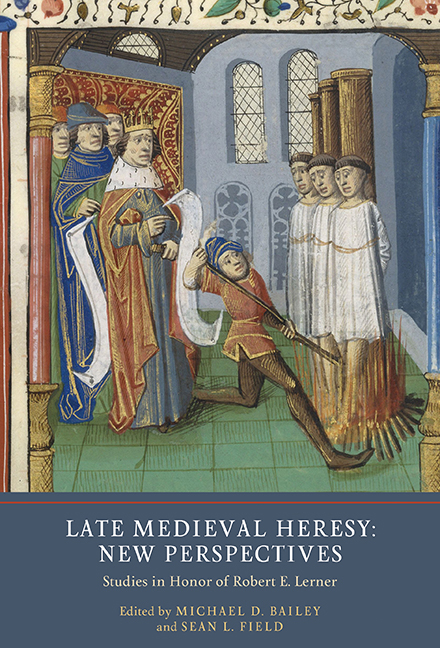Book contents
- Frontmatter
- Contents
- Preface: Robert E. Lerner: A Portrait
- List of Contributors
- Introduction: Historiography, Methodology, and Manuscripts: Robert E. Lerner and the Study of Late Medieval Heresy
- 1 The Heresy of the Templars and the Dream of a French Inquisition
- 2 The Dissemination of Barthélemy Sicard's Postilla super Danielem
- 3 Magic, Mysticism, and Heresy in the Early Fourteenth Century
- 4 The Making of a Heretic: Pope John XXII's Campaign against Louis of Bavaria
- 5 Unusual Choices: The Unique Heresy of Limoux Negre
- 6 Princely Poverty: Louis of Durazzo, Dynastic Politics, and Heresy in Fourteenth-Century Naples
- 7 Disentangling Heretics, Jews, and Muslims: Imagining Infidels in Late Medieval Pastoral Manuals
- 8 New Frontiers in the Late Medieval Reception of a Heretical Text: The Implications of Two New Latin Copies of Marguerite Porete's Mirror of Simple Souls
- 9 Disputing Prophetic Thought: The 1466 Questio quodlibetalis of Johannes of Dorsten
- 10 Heretics, Allies, Exemplary Christians: Latin Views of Ethiopian Orthodox in the Late Middle Ages
- 11 ‘By them in reality I meant the Jews’: Medieval Heretics in the Work and Life of Renate Riemeck (1920–2003)
- Afterword: Who or What Was a Heretic in the Late Middle Ages?
- Robert E. Lerner: A Chronological Bibliography
- Index
- York Medieval Press: Publications
6 - Princely Poverty: Louis of Durazzo, Dynastic Politics, and Heresy in Fourteenth-Century Naples
Published online by Cambridge University Press: 14 June 2019
- Frontmatter
- Contents
- Preface: Robert E. Lerner: A Portrait
- List of Contributors
- Introduction: Historiography, Methodology, and Manuscripts: Robert E. Lerner and the Study of Late Medieval Heresy
- 1 The Heresy of the Templars and the Dream of a French Inquisition
- 2 The Dissemination of Barthélemy Sicard's Postilla super Danielem
- 3 Magic, Mysticism, and Heresy in the Early Fourteenth Century
- 4 The Making of a Heretic: Pope John XXII's Campaign against Louis of Bavaria
- 5 Unusual Choices: The Unique Heresy of Limoux Negre
- 6 Princely Poverty: Louis of Durazzo, Dynastic Politics, and Heresy in Fourteenth-Century Naples
- 7 Disentangling Heretics, Jews, and Muslims: Imagining Infidels in Late Medieval Pastoral Manuals
- 8 New Frontiers in the Late Medieval Reception of a Heretical Text: The Implications of Two New Latin Copies of Marguerite Porete's Mirror of Simple Souls
- 9 Disputing Prophetic Thought: The 1466 Questio quodlibetalis of Johannes of Dorsten
- 10 Heretics, Allies, Exemplary Christians: Latin Views of Ethiopian Orthodox in the Late Middle Ages
- 11 ‘By them in reality I meant the Jews’: Medieval Heretics in the Work and Life of Renate Riemeck (1920–2003)
- Afterword: Who or What Was a Heretic in the Late Middle Ages?
- Robert E. Lerner: A Chronological Bibliography
- Index
- York Medieval Press: Publications
Summary
In March 1362, Bertrand de Meyshones, archbishop of Naples, and three Dominican inquisitors initiated heresy proceedings against the Angevin prince Louis of Durazzo (1324–62). Louis stood charged with offering assistance to radical Franciscan dissidents who had rallied around him, and the trial formed part of a larger papal effort to root out Spiritual Franciscan heresy. Louis's birth and social standing were enough to make the trial noteworthy. The grandson of King Charles II of Naples (d. 1309), Louis belonged to a celebrated royal dynasty that ruled a papal fief (the Kingdom – Regno – of Naples) and identified itself as the champion of the Church and papacy. Louis was also the nephew of Élie de Talleyrand (1301–64), the cardinal protector of the Franciscan order and leader of a powerful faction within the papal curia. Louis was thus phenomenally well connected, with close ties to the papal hierarchy.
Equally extraordinary, Louis was already in prison for rebelling against his cousins Johanna of Naples and Louis of Taranto, who ruled Naples. Louis's rebellion was driven by desire for greater control over his family's wealth and holdings, and he had twice summoned Great Companies into the Regno, where they terrorized Neapolitan subjects. Louis's revolts garnered support, both within the Regno and outside it, and he portrayed himself as moved by orthodox religious zeal when he rebelled in 1356, during a period when Naples’ rulers were excommunicated for failing to pay the annual census they owed the Church. Louis of Durazzo was a rebel and a traitor in the minds of many contemporaries, but it was not obvious that he was a heretic. Yet, when he was finally captured and imprisoned in 1362, he and his supporters were examined not for political insurrection but for heresy. In a paradoxical twist of fate, a prince who had rebelled in order to recover his wealth after finding himself reduced to povero stato, in the words of Matteo Villani, faced trial for his support of apostolic poverty.
- Type
- Chapter
- Information
- Late Medieval Heresy: New PerspectivesStudies in Honor of Robert E. Lerner, pp. 116 - 136Publisher: Boydell & BrewerPrint publication year: 2018



